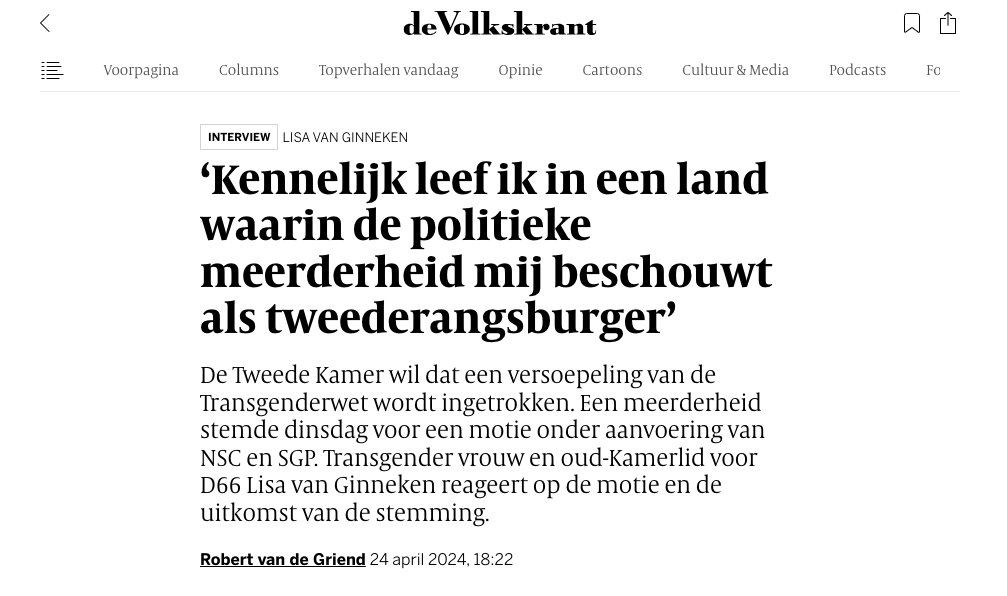Jan Bergstra & Laurens Buijs
Amsterdam Gender Theory Research Team (AGTRT).
‘Apparently I live in a country where the political majority considers me a second-class citizen,’ was the headline of a large piece in the Volkskrant last Wednesday about the stranding of the new transgender law due to a motion by NSC(archive.ph). The quote comes from Lisa van Ginneken, former D66 MP and a trans woman herself.

Van Ginneken was given a generous platform by the Volkskrant to express her disappointment with the NSC’s desire to remove the bill from the agenda without further debate. Van Ginneken is transgender, and there is no doubt about that, her female gender is also established at the civil registry.
To argue that the political majority considers her a second-class citizen is absurd. For years, the Netherlands has had legislation enabling gender transition, providing medical, psychological and ultimately legal support. This is in no way compromised by NSC. The headline of this Volkskrant article is thus completely misleading.
Conversely, there is not the slightest evidence that a majority in the Netherlands wants to have the opportunities for gender transition that they themselves used at the time abolished or even reduced. Groups that would like to do so do exist, such as the Roman Catholic Church, some Protestant Christian denominations, and the TERF feminists, but they do not currently have a majority, nor is such a majority in sight.
Lisa van Ginneken’s statement is completely inaccurate and thus also indicative of the style of the debate. Van Ginneken does not bother to characterize the situation even remotely adequately and immediately fires a sharp shot at the NSC’s Nicolien van Vroonhoven.
Read more about the arguments not taken seriously by trans activists:
The arguments against the now-discontinued “new transgender law” may be overstated, but not all are invalid
The complications of the new transgender law are that it actually broadens the notion of transgender to include anyone who claims of themselves to be transgender. It is incomprehensible to us how Van Ginneken and other supporters of this law can think that, for example, a man, solely by claiming of himself to be a woman, can also require others to see it that way, on staffe of judirical complications for negligence in that regard. That this includes women’s rights is obvious, and for Van Ginneken to pretend that this argument is not there is downright curious.
Van Ginneken is apparently in favor of stripping the concept of gender (and its associated classification into male, female and neutral) of any verifiable meaning in practice. But that very position ultimately runs the risk of jeopardizing existing rights to gender transition as well.
Van Ginneken thus turns the world upside down, disrupting a normal course of debate about transgender people in the Netherlands. She too can understand that the NSC’s action actually protects the existing rights of transgender persons. In this way, legal access to transgender status is at least preserved, rather than needlessly expanded with all the risks that entails.
We agree that the existing legislation for transgender people is not adequate in all respects, and that renewal of the legislation is appropriate; we wrote about this last November (see AGTRT-BF18). But before such a thing can be achieved, a proper debate must be held.
Read more about the need for a new transgender law:
A new transgender law is indeed needed
It is too easy every time to point the finger at opponents’ alleged transphobia. There are some radical splinter groups, but mostly there are many moderate concerns from people who back it up with understandable arguments. For example, they point to the excessive role of self-identification in the rejected law, and the gender erosion that may result.
Time and again, it is the representatives of transactivism themselves who prove to be extreme, unfairly blackening opponents and not taking their arguments seriously. We see this tendency not only with Van Ginneken, but also with other frontline trans activists, and also with the organizations that claim to stand up for transgender people, such as Transvision and Transgender Network.
Read more about the problems with frontline trans activists:
Valentijn de Hingh and the (self-claimed) rights of the frontline transactivist
These people and groups claim to represent transgender people, but we dispute that. They share a great blind spot for their own radical position and unwillingness to engage in substantive debate. In doing so, we believe, they are not helping the legal position of transgender people, but rather jeopardizing it.
Before adjusting transgender legislation is an issue, it is necessary for the trans movement itself to show that it is capable of truly engaging in a discussion, in which the arguments of opponents are taken seriously and not prematurely dismissed as anti-trans or transphobic.

Leave a Reply